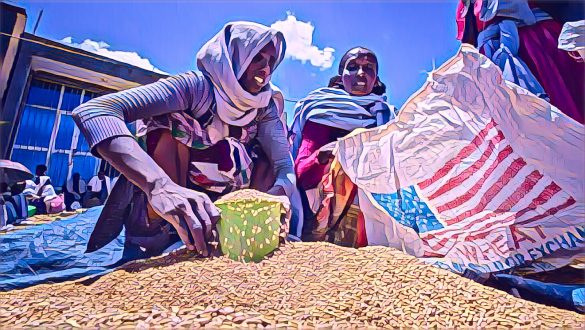The issue of the weaponization of food aid in Zimbabwe, as raised by the Heal Zimbabwe Trust (HZT), highlights a pressing concern in the realm of humanitarian aid and political manipulation. This issue has come to the forefront after revelations that the Zanu PF party, Zimbabwe’s ruling political entity, has taken charge of overseeing the distribution of food aid. This oversight includes aid provided by the government as well as that by development partners.
Zimbabwe is currently facing significant challenges due to an El Niño-induced drought, which has exacerbated the nation’s food insecurity. The Department of Social Welfare is tasked with managing the distribution of this critical aid. However, the involvement of a political party in these efforts raises serious ethical and practical concerns. The primary fear, as voiced by HZT, is that food aid could be used as a political tool to coerce or reward populations based on their political affiliations, rather than their need.
The potential political weaponization of food aid can lead to the marginalization of vulnerable groups, particularly those who support opposition parties. Statements by Zanu PF officials have sparked concerns about the erosion of the democratic foundation of Zimbabwe. There appears to be a blurring of lines between the state mechanisms and the interests of the ruling party, leading to violations of fundamental rights, including the right to receive aid without discrimination.
HZT has called for strict measures to prevent the abuse of food aid distribution. It advocates for the distribution process to be handled exclusively through the Department of Social Welfare, in collaboration with local leadership, both traditional and elected. This approach aims to ensure that the distribution of aid is impartial and solely needs-based, preventing any form of political bias or coercion.
Further complicating the issue is the broader context of corruption and abuse in the management of aid. The Zimbabwe Human Rights Commission and the Zimbabwe Anti-Corruption Commission are urged to actively monitor and prevent corruption and malpractices in the distribution of food aid, which is often funded by taxpayers and multilateral donors. Political parties are also called upon to control their members to prevent them from exploiting the distribution process for political gains.
Amidst these challenges, the role of civil society organizations and development partners becomes crucial. HZT encourages these bodies to actively monitor and hold accountable all stakeholders involved in the distribution of food aid. This is particularly important in ensuring that the efforts to address poverty and food insecurity are conducted transparently and fairly, especially in light of the ongoing drought conditions that are severely affecting the country.
The concern over the weaponization of food aid is not new in Zimbabwe. The ruling Zanu PF party has long been accused of using food handouts as a means to manipulate and control vulnerable populations, especially in remote areas. This practice not only undermines the ethical distribution of aid but also perpetuates a cycle of dependence and political subjugation. By leveraging basic necessities as a tool for political influence, the ruling party can maintain its power by capitalizing on the desperation of the populace.
As Zimbabwe continues to grapple with severe climatic and socio-political challenges, the integrity of humanitarian aid distribution remains a critical issue. Ensuring that aid reaches those who need it most, without interference or manipulation, is essential for addressing the immediate needs of the population and for upholding the principles of justice and equality in a democratic society.
The weaponization of food aid in Zimbabwe represents a complex interplay of humanitarian need and political strategy. It underscores the importance of maintaining clear boundaries between state responsibilities and political interests. Ensuring that food aid serves its intended purpose of relieving hunger, rather than as a tool for political coercion, is paramount in fostering a just and equitable society, especially in times of crisis.
Source: Newsday


